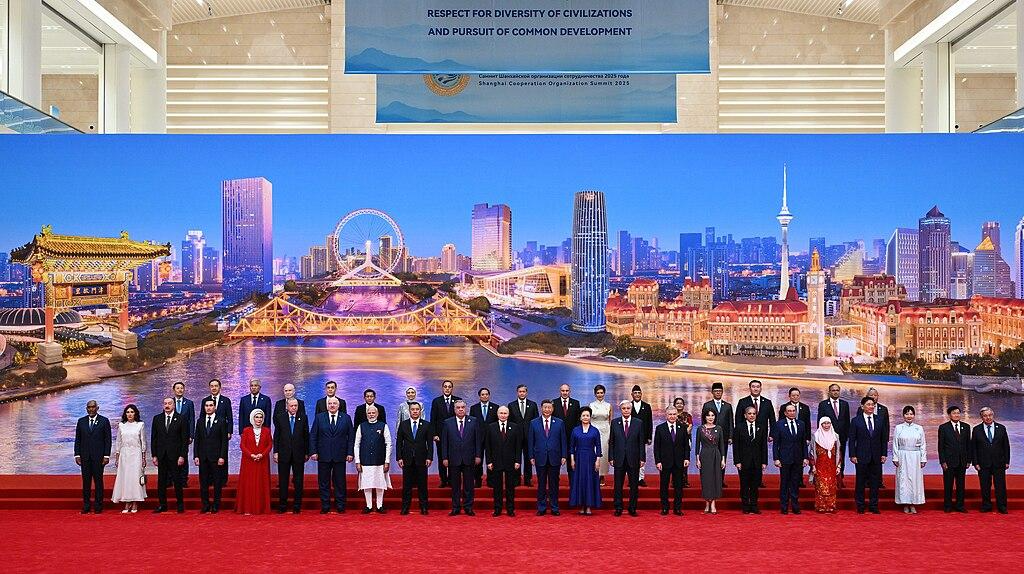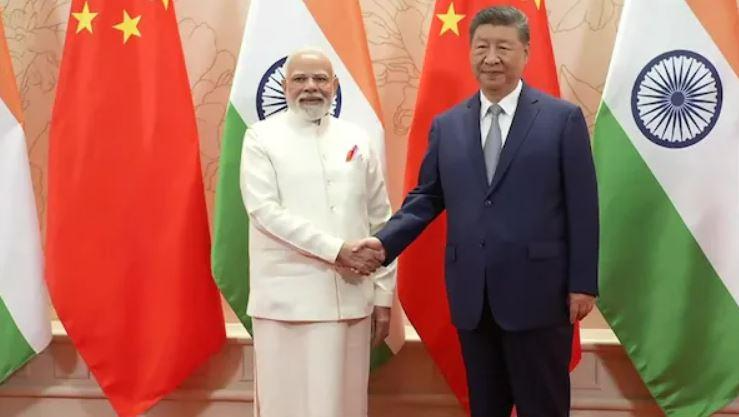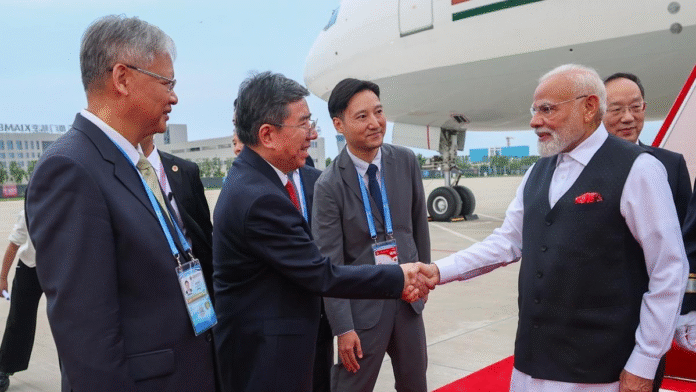Prime Minister Narendra Modi was given a rousing welcome by young children in red and white attire and guard of honour by smartly turned out PLA soldiers, as Air India One landed at Binhai International Airport in Tianjin province of area close to Bohai sea in north-eastern part of Peoples Republic of China on August 30, 2025, on a historical two-day visit to attend Shanghai Cooperation Summit 2025 after his successful friendly trip to Japan. He visited China after seven years.
Modi’s visit to two major powers of Asia (Japan and China) conveys a strong message to the United States and West that India is capable of neutralising the Tariff War and follow an independent path looking after the interests of Indian farmers, milk producers and domestic producers of agro-based industries, and not to induct genetically modified crops, fruits, milk, vegetables and fodder. He was welcomed by the Chinese delegation at the airport and later by the Indian diaspora at the entrance of the Hotel Wanda by presenting traditional folk dance and chanting of Vande Matram and Bharat Mata Ki Jai.
The Shanghai Cooperation Organisation (SCO) was formed in 2001 as an Eurasian international political, security and economic organisation after the disintegration of former Union of Soviet Socialist Republics (USSR), on the initiative of China. There were initially five core members, China, Russia, Kyrgyzstan, Tajikistan and Kazakhstan, with an aim of solving border disputes and establishing a strong security bloc. By 2024, five more members (Uzbekistan, India, Pakistan, Iran and Belarus) were inducted. The SCO headquarters is located in Beijing. The Regional Anti Terrorism Structure (RATS) office has been established in Tashkent, Uzbekistan. As of date, the SCO family has been extended to 14 dialogue partners and two nations as observers. The present summit had delegations from 25 countries and top international organisations. The present Secretary General is Nurlan Yermekbayev, former Defence Minister of Kazakhstan.
The venue for the 25th SCO summit was Meijiang Convention and Exhibition Centre in Tianjin, situated on the eastern coast of China near the Yellow Sea. The summit was held on August 31 and September 1, 2025.
The SCO was formed in 2001 as an Eurasian international political, security and economic organisation after the disintegration of the former Union of Soviet Socialist Republics (USSR), on the initiative of China. India and Pakistan were included in 2017. Iran joined in 2023, and Belarus in 2024
Chinese President Xi Jinping was the main host. The following heads of state attended the summit: PM Narendra Modi (India), President Vladimir Putin (Russia), President Masoud Pezeshskian (Iran), President Alexander Lukashenko (Belarus), President Kassym Jomart Tokayev (Kazakhstan), President Shavakat Mirziyoyev (Uzbekistan), President Sadyr Japareov (Kyrgyzstan), President Emomali Rahmon (Tajikistan), President Recep Erdogon (Turkiye), Malaysia PM Anwar Ibrahim, PM Shahbaz Sharif (Pakistan), President Abdul Muzzio (Maldives), Nepal PM K P Sharma Oli & Myanmar Military Chief Min Aung Hliang. Moreover, Nikol Pashiyan (PM of Armenia), Mostafa Madbouly (PM of Egypt), President Houngloun Sisoulith (Laos), PM Lurong Curong (Vietnam), and President Serdar Berdimuhamedov (Turkmenistan) were special invitees. Moreover, UN Secretary General Antonio Guterres and ASEAN Secretary General Kao Kim Hourn were invited as guests of honour. Indonesian President Prabowo Subianto had shown an inability to join due to internal turmoil. Indonesian foreign minister represented his country.
The SCO was conceived after the end of the Cold War in 1996 as a security bloc and was named the Shanghai Five, after the collapse of the USSR. The initial members were China, Russia, Kazakhstan, Kyrgyzstan, and Tajikistan. The main aim was to solve border issues, and the headquarters was in Beijing. Uzbekistan joined in 2001. India and Pakistan were included in 2017. Iran joined in 2023, and Belarus in 2024. The group now has 14 Dialogue Partners, including Saudi Arabia, Myanmar, Cambodia, Egypt, Laos and Turkey. The last summit was held in Kazakhstan.

The SCO summit is required to be held annually, and heads of state are required to attend according to the Charter of the organisation. Moreover, a preliminary meeting of foreign ministers of member nations will also be held to work out the agenda and terms of the main summit. The details of earlier summits are as follows: The first summit was held in Shanghai, China, on June 14-15, 2001, second summit was organised at Saint Petersburg in Russia on June 7, 2002, third summit in Moscow in 2003, fourth in Tashkent Uzbekistan in 2004, fifth summit in Astana, Kazakhstan in 2005, sixth summit was again held in Shanghai in 2006, seventh summit venue was Bishkek, Kyrgyzstan in 2007, eighth summit was at Dushanbe, Tajikistan in 2008, ninth summit was at Yekaterinburg, Russia in 2009, 10th summit venue was in Tashkent in 2010, 11th summit was held at Astana, Kazakhstan in 2011, 12th summit was held in Beijing in 2012, 13TH summit was held in Bishkek, Kyrgyzstan in 2013, 14th edition was virtually conducted in Dushanbe, Tajikistan in 2014, 15th summit at Ufa, Russia in 2015, 16th in Tashkent in 2016, 17th in Astana Kazakhstan in 2017, 18th in Qingdao, China in 2018. The 19th summit was held in Bishkek, Kyrgyzstan, in 2019, 20th was held virtually in Russia on November 10, 2020. The venue for the 21st summit was Dushanbe, Tajikistan, in 2121. The 22nd summit was organised in Samarkand, Uzbekistan, in 2022. India was the venue for the 23rd edition, which was held through video conferencing in 2023. The 24th edition was held at Astana, Kyrgyzstan, in 2024.
The United States and NATO view the SCO with suspicion and as a potential threat in the Central Asia region. SCO is a non-military alliance, but China and Russia have joined with the former allies of the Warsaw Pact countries. India does not fit well in the alliance because Pakistan is also a member of the SCO
The objectives of SCO are multifold. The primary objective is to build a security environment to deal head-on with terrorism, separatism and extremism and also take action against human and drug trafficking and weapon cartels. A terrorist blacklist has also been initiated. Regional Anti Terrorism Structure (RATS) was established after the SCO summit in Tashkent in 2004. A treaty was initiated with the Collective Security Treaty Organisation in 2017. Cyber warfare by one nation against another nation was also addressed. RATS has foiled 600 terror plots and extradited about 500 suspected terrorists. At the last Summit in Astana, Kazakhstan, the SCO advocated for a multi-polar world under UN supervision.
Military cooperation among member nations was another objective of the SCO. There have been a number of joint military exercises held by Russia, China and Kazakhstan, named Peace Mission, in 2005, 2007 and 2009. It was also highlighted that it was not a military alliance against any country. After the Russian invasion of Ukraine, joint military missions have been shelved, and all members have distanced themselves from Russia.
India has always opposed it as a military alliance. Economic cooperation has been the main objective among member nations. At the 2003 summit, the Chinese Premier proposed a Free Trade Area in the SCO to ensure the free flow of goods and services without tariffs. At the Moscow summit in 2005, Russia proposed joint energy projects, exploration of hydrocarbon reserves and joint use of water resources. SCO Interbank consortium was also proposed. Iran proposed a common currency in the SCO and discarded dollar-based transactions.
The Eurasian Economic Union was formed in 2014. Cultural exchange programmes and student visits were also secondary objectives of SCO among member nations. SCO Arts Festival and Exhibitions were held in the Astana summit in 2005, and the folk dance festival was organised in 2008. The SCO+ initiative was suggested by President Putin at the Moscow summit in 2020 to include CIS nations and BRICS members in the fold of the SCO.
China’s President Xi Jinping has emphasised that India and China should not let the border issue define the overall relationship between the two, and both countries must adjust and handle ties with a strategic and long-term perspective
The United States and NATO view the SCO with suspicion and as a potential threat in the Central Asia region. Although SCO is a non-military alliance but China and Russia have joined together with the former allies of the Warsaw Pact countries. India does not fit well in the alliance, as Pakistan is also a member of the SCO. The Russia-Ukraine war has also weakened the SCO. Kyrgyzstan and Tajikistan had a conflict. In June 2025, India refused to endorse a joint statement at the SCO’s Defence Minister Conclave in Qingdao, China, as it did not reflect a balanced approach to dealing with terrorism. It criticised terrorism in Baluchistan, Pakistan, but did not criticise Pak-sponsored terrorist attack at Pahalgam in Kashmir, India, where 26 tourists were massacred on April 22, 2025.
On July 15, 2025, India’s External Affairs Minister S Jaishankar at the SCO Council of Foreign Ministers emphasised the need for SCO to uphold its founding principle by maintaining an uncompromising stance against all types of terrorism and extremism and should not discriminate. He also raised concerns over the construction of the Medong Hydropower Project on the Brahmaputra River (Yarlung Tsangpo) in Tibet and the sharing of hydrological data.

India has generally avoided SCO meetings and participated at a lower level. However, this time, Prime Minister Modi decided to attend the Tianjin summit with full strength and use this platform to tackle the tariff war of POTUS Donald Trump and take on the onslaught jointly with China. He had a long bilateral meeting with the Chinese President on the sidelines of the SCO summit on August 31, 2025. His main aim was to restore better trade relations with China, restore the supply of rare earth material and defuse tensions on Indo-China borders amicably.
A boost in India-China bilateral relations will help both nations to neutralise the effects of heavy tariff sanctions imposed unilaterally by the United States. The tariff war will give rise to the strong trident of Russia, India and China (RIC) and a challenge to the United States. PM Modi highlighted during his bilateral meeting with the Chinese president that the welfare of 2.8 billion people in the Himalayan region is linked with harmonious ties between India and China, and friendship is the right choice.
Geopolitical and geo-economic equations have undergone drastic changes, bringing the Dragon and Elephant closer and facing the economic challenges jointly. Air India and Air China will soon be commencing non-stop direct flights, making a friendship aero bridge between New Delhi and Beijing
President Xi also emphasised that both countries should not let the border issue define the overall relationship and must adjust and handle ties with a strategic and long-term perspective. Both agreed that “we two are the most populous and important countries in the world and members of the Global South.” Geopolitical and geo-economic equations have undergone drastic changes, bringing the Dragon and Elephant closer and facing the economic challenges jointly. Air India and Air China will soon be commencing non-stop direct flights, making a friendship aero bridge between New Delhi and Beijing.
-The writer is an Indian Army veteran and a defence analyst. He has keen interest in Geo-strategic affairs and writes regularly on internal and external affairs issues related to India and neighbours. The views expressed are personal and do not necessarily reflect the views of Raksha Anirveda






